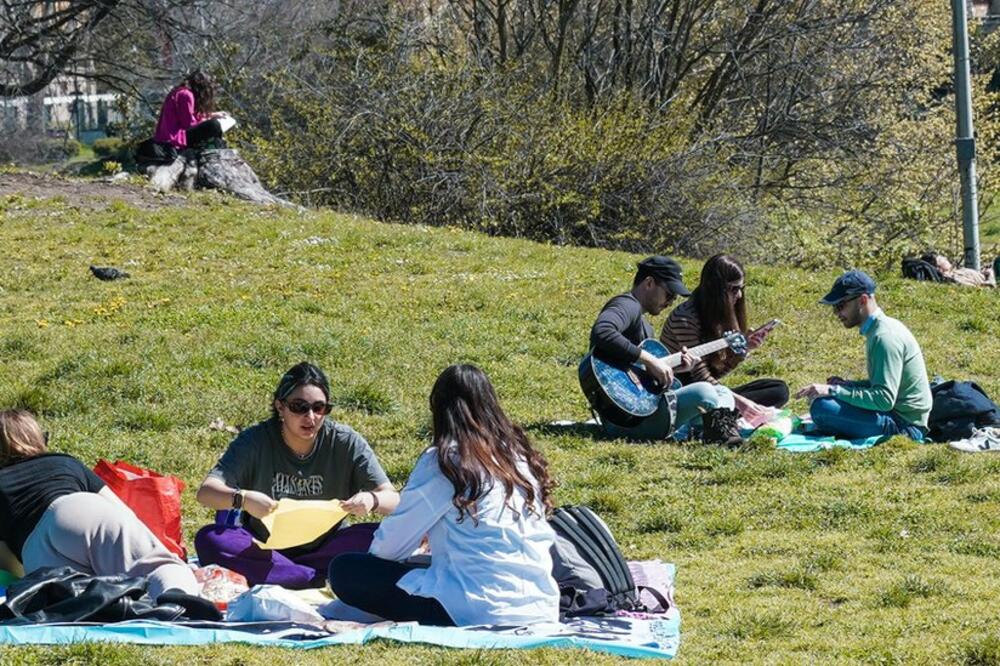"Is it harder to be a man or a woman today?".
The red-haired girl puts down her glass for a moment and answers after a short pause.
"I wouldn't say it's more difficult, but we went too far, to a totally different extreme.
"It's one thing to fight for equal rights, and the other is what's happening now - every different attitude is declared chauvinistic," says 24-year-old Vanja Jovanović, while clearing the table in a Belgrade cafe.
He belongs to Generation Z, Gen Z for short, who grew up while the world was switching from flip mobile phones to smartphones.
Vanja is not alone in this way of thinking.
- Why is it increasingly difficult for young people in Serbia to make friends?
- What are young people in Serbia afraid of?
- Generation Z's pre-election diary
About 40 percent of young people believe that they should firmly stick to folk customs and traditions, according to a survey in Serbia in the summer of 2023. Violent extremism and youth: From misinformation to radicalism.
46 percent of them are supporters of the idea that the morality preached by their religious community should be applied.
A study also shows that this is not a trend only among generation Z (born between 1997 and 2012) in Serbia. of the Global Institutetand for female leadership from London conducted at the end of 2023.
About 60 percent of members of Generation Z believe that "we have gone too far in the promotion of women's equality and that men are more discriminated against," according to the results of that survey.
Millennials (people born between 1981 and 1996) think similarly, and "baby boomers" (born between 1946 and 1964) are not far behind.
About 40 percent of Gen Z members agree with this statement, slightly more women from the millennial generation, followed by "baby boomers" at the same rate.
"The results are worrying and it's a growing trend, and social networks and platforms play a big role in it.
"Increasingly, individuals with controversial statements such as Andrew Tate are advertising there, directly addressing young people, advising them how to step up and live," says Bobby Duffy, from the Institute of Politics at King's College London, for the BBC in Serbian.
Andrew Tate is a controversial British-American influencer arrested in Romania in early 2023, on charges of human trafficking, organized crime and rape.

He is described as an "absolute misogynist", and became popular by advocating a life in which women are subordinate to men.
According to the aforementioned research, a fifth of young men aged 16 to 29 look favorably on his influence.
'Misinterpretation'
Mihailo Božović, a student of Serbian language and literature, does not think that men are in a more difficult position than women, but he notices that there are more and more young men who want to return to the lifestyle of previous generations.
"Nobody is talking about going back to the period when women were oppressed.
"Gender equality is necessary, but today it is misinterpreted and should not be a means of attack, and this is happening," said this 28-year-old student from Kragujevac, a city in central Serbia, for the BBC in Serbian.
In the former Yugoslavia (it consisted of Serbia, Montenegro, Macedonia, Bosnia and Herzegovina, Croatia and Slovenia), women were equaled with men in all areas of state, economic and socio-political life by the Constitution of the Federative People's Republic of Yugoslavia, adopted in January 1946, which was much earlier compared to many European countries.
In recent years, there are more and more of them in high positions, they make up a third of the parliament, they are also represented in the government, and many women decided to start a business.
Although it seems that women, at least in terms of numbers, are in a much better position than in other parts of the world, in reality the situation is far from ideal and one cannot talk about a "serious improvement of their position" in Serbia, experts warn. which the BBC has written about several times.

However, the report "Global Attitudes on Gender Equality" shows that the number of people who believe that too much is expected of men to support gender equality is on the rise.
More than 30 countries participated in it: from South Korea, India, Great Britain, America to Italy and Germany.
More than 50 percent of young people believe that enough has already been achieved in their country in the field of women's rights and equalization with men.
In 2019, that number was 41.
The same study shows that a third of male respondents support the views of Canadian psychologist Jordan Peterson, who spoke publicly about the "demoralization of young men".
- What's gone wrong for millennials
- Young people in Serbia are third on the list of the happiest in the world
- Do boomers have the best time in bed?
Family and marriage
Technology enables exposure to different cultures, but this is not always a guarantee for openness and respect for diversity, explains Marija Pejačić, social psychologist.
"Members of generation Z are on social media very early and before they reach the level of cognitive development that allows them to critically look at the world around them,
"It often happens that they form positions based on a misunderstanding of the available data, which can be the cause of the negative attitude of certain members of that generation towards feminism," she told the BBC in Serbian.
Due to the large number of different, sometimes conflicting information that they need to process, they may feel insufficiently capable of making a judgment, which makes them feel insecure and uncertain, she adds.
"In their desire to restore the broken security, they return to something that has been known and traditionally cherished for many years, such as marriage and family.
"It can be attractive to people facing the challenges of the modern world, marked by rapid changes and insecurity, to which the economic crisis and the corona virus pandemic have contributed in particular," says Pejačić.
In 2022, the number of weddings in Serbia was 32.821, while 9.813 marriages were divorced. data are from the Republic Institute of Statistics.
Marriages and divorces increased by 0,2 percent compared to the previous year.

Reports Over the years, umbrella organizations for youth have shown that they increasingly support family values and the family.
"I live and grew up in Serbia, which to some extent is considered a patriarchal country, so it doesn't surprise me much," says Igor Išpanović, a 26-year-old from Subotica, a city in the far north of the country.
"I'm sorry it's like that," he adds shortly.
According to the original interpretation, patriarchy is a social arrangement in which the highest authority is the man, and the woman takes care of the house and children.
Although the father is the head of the family, the mother has a special place, which is confirmed by many folk proverbs in the Balkans such as A woman is a woman, but a mother is a mother, as well as a large number of songs and literary works in which she is a key character.
At the base of everything is the family, great attention is paid to ancestors, tradition, but also religion, which is why such societies are said to be conservative and closed.
- How patriarchy really came about
- Why mothers have to "think of everything"
- Why New Mothers Are Expected to Quickly "Get Back to the Old Line"
- "We don't have children because we want to and it's good for us"
Although much has changed in the Balkans in recent decades, more and more studies indicates that patriarchal patterns still prevail.
'What do women complain about when their salaries are more or less the same as ours?', is one of the more common arguments that Igor Išpanović hears when he begins to discuss the position of women.
Data from institutions and the non-governmental sector show that the wage gap between women and men in Serbia is between 8,8 and 11 percent, formally ranking it among the countries with the lowest wage differences. in Europe.
However, when wages are observed according to the level of education or professions, the gap in favor of men is significantly larger, it is stated in available analysis of the Republic Institute of Statistics (RZS) from 2018.
"Gender equality should be taken for granted, although I am aware that this is far from the truth - the role and position of women in society is still being questioned. We may have equalized the rights of women and men on the surface, but in reality something is different.
"Conservative thinking is represented both in my generation and in older generations," he adds for the BBC in Serbian.
Numerous public opinion polls show that the Serbian Orthodox Church is one of the institutions which is most trusted, and she stands for the traditional family, biological sex determination, he is against abortion i of the law on gender equality.
'Women's Trad'
In recent years, a movement has sprung up on the Internet trad (short for traditional) woman.
It brings together young influencers up to the age of 35 in gorgeous dresses inspired by fifties fashion, who share recipes and ideas about housekeeping.
They call on society to return to the old norms of gender roles.
They lean towards conservatism and anti-feminism and are popular on TikTok.
Some videos have more than 187 million views.
A huge gap between generations
U research by the Global Institute for Women's Leadership, a third of Gen Z respondents believe that a man who stays at home to take care of children is 'less masculine'.
A fifth of their peers share the same attitude.

However, the percentage of men of older generations who agree with this attitude is three times lower.
Millennials, for example, spend three times more time with their children than their parents before them.
In the last 20 years, the number of countries where paternity leave is guaranteed by law has increased.
Fathers in Serbia also have this right, but few use it.
On maternity leave mostly fathers between the ages of 36 and 40 left, with the least ones younger than 30 and older than 50.
- Three generations of fathers in Serbia: Is being a parent a new occupation for men
- First steps with dad
- Paternity leave for fathers - why more men don't take it
- Paternity leave of fathers: What can be learned from Sweden
"There's a huge generational gap, and it's stunning," Bobby Duffy, the report's author, said in a phone interview.
Psychologist Marija Pejičić notes that individual differences should not be ignored, as well as the environment where you are from, which can influence the formation of attitudes.
"The attitude of this generation towards various social phenomena is much more complex than it seems at first glance and it is influenced by a large number of factors," he adds.
She has been teaching social psychology for years at the Faculty of Philosophy in Niš, the largest city in the south of Serbia.
He recognizes the willingness of students to think critically about the information they receive.
"We try to encourage a critical attitude in them, because one day they will be role models for new generations.
"They should be aware that they can contribute to the acceptance of diversity and the creation of a fairer and more open society," he adds.
Watch the video: Is there a place for gender-sensitive language in Serbia
Follow us on Facebook, Twitter, Instagram, YouTube i Viber. If you have a topic proposal for us, contact us at bbcnasrpskom@bbc.co.uk
Bonus video:




